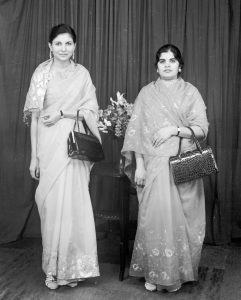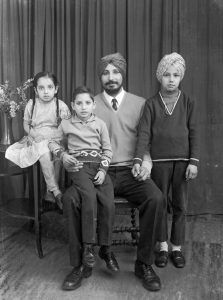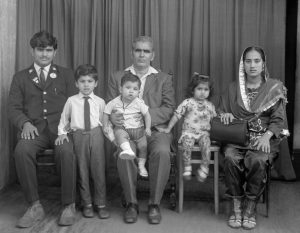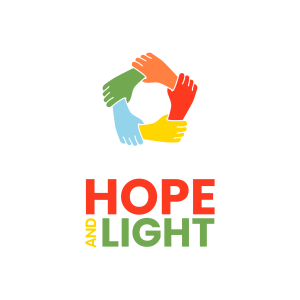Breaking the Silence Around Mental Health in South Asian Communities
As part of South Asian Heritage Month, Ayesha, who works as Community Engagement Worker for the Hope and Light programme, has written a blog that explores the stigma attached to mental health within South Asian Communities.
We don’t really talk about that
Written by Ayesha, Community Engagement Worker, Hope and Light Programme
Breaking the Silence Around Mental Health in South Asian Communities
 In South Asian households, strength is often stitched into our very upbringing. We learn to endure, to persevere, to carry generations of sacrifice on our backs with quiet pride. But what happens when that silence becomes suffocating, or when we’re unaware of the load we’re actually carrying?
In South Asian households, strength is often stitched into our very upbringing. We learn to endure, to persevere, to carry generations of sacrifice on our backs with quiet pride. But what happens when that silence becomes suffocating, or when we’re unaware of the load we’re actually carrying?
Recently, mental health programme Hope and Light held focus groups with South Asian Community members.
A common thread emerged: the journey to mental wellbeing is anything but straightforward. Yes, this is something we already know. However, cultural barriers add another layer, complicating the journey and making it even harder to access support. Beneath our vibrant culture, tight-knit families, and deep-rooted traditions lie painful barriers that keep many from seeking the help they desperately need.
Here are some of the key themes that emerged, experiences shared by community members, and issues we must address:
Stigma Starts at Home
Many participants shared how mental health struggles are met not with compassion, but with criticism. Family members, including extended family and in-laws, often label those who speak up as ‘dramatic’, ‘attention-seeking’. or ‘overthinkers’. Men face even harsher judgment, sometimes being called ‘crazy’, ‘possessed’ or even ‘abusers’ simply for expressing vulnerability.
Take these pills and you’ll be fine.
Many stated that the healthcare system isn’t always a safe space either. Many feel services are quick to prescribe medication without addressing the cultural context or underlying emotional distress. Side effects follow but real healing doesn’t.
 A Crisis-Only System
A Crisis-Only System
The perception is mental health support often only becomes available when someone is in severe crisis. But what about those silently battling anxiety, stress, or trauma every day? Participants highlighted how the system often fails to catch people before they fall.
Language Lost in Translation
Even when someone finds the courage to ask for help, many felt that language can be a major barrier. A theme that emerged was that a lack of interpreters or culturally aware practitioners leads to misdiagnosis, confusion, and disengagement. Many South Asian languages don’t even have a word for ‘mental health’, making it difficult to explain the concept or understand what support is available.
Isolation Within the Home
It was felt that for many, the home is not a place of refuge. It’s often a space of control, expectation, and limited freedom. Saying ‘no.’ can be dangerous. Speaking up can mean family rejection. Emotional abuse is normalised and personal boundaries are taboo.
Men: Raised to Be Strong, Punished for Being Vulnerable
Men in our communities are raised to be stoic providers. Expressing emotion is seen as weakness. As a result, many felt that, pain is bottled up, mistrust grows, and reaching out for help is perceived as a threat to their masculinity. Most agreed that the stigma around seeking support makes many feel like ‘less of a man’.
Trauma passed down, silence passed on
Generational trauma runs deep. Our parents and grandparents focused on survival, often pushing emotions aside. Most felt that the mindset of ‘just get on with it’ has left many in the next generation feeling emotionally stuck and unseen. Many don’t even realise this because they’ve grown up with it as the norm, unaware that emotional neglect isn’t something we have to accept or repeat.
 Hope and Light hopes to break down the stigma and barriers around mental health that many in the South Asian community witness and experience. Hope and Light is a programme of culturally responsive mental health services with an approach built on cultural awareness ensuring our services align with the community’s values and lived experiences.
Hope and Light hopes to break down the stigma and barriers around mental health that many in the South Asian community witness and experience. Hope and Light is a programme of culturally responsive mental health services with an approach built on cultural awareness ensuring our services align with the community’s values and lived experiences.
You can find out more about the services Hope and Light delivers here.
Photographs above are part of the Belle Vue Photo Archive collection held at Bradford District Museums & Galleries.
You can see the full collection of photographs here
Posted on: 25th July 2025